Table of Contents
CBSE Class 7 English Grammar – Subject-Verb Agreement
Definition of Subject-Verb Agreement
Subject-verb agreement tells us about the ways a subject will agree to its verb. Generally, rules of tense are in the category of subject-verb agreement, but apart from these rules there are some other rules by which a subject agrees to the verb.

e.g.
- Simran is late today.
- We are always happy.
But, we shall study the important deviations from the above two rules.
Rules for Subject-Verb Agreement
- Two nouns or pronouns when joined by ‘and’ takes plural verb.
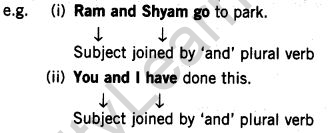
- When ‘one of ’ is used with a plural noun, the verb after it is always singular,
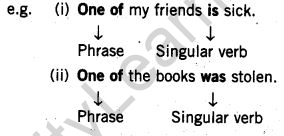
- Nouns that are connected by ‘each’ and ‘every’ take a singular verb with them.
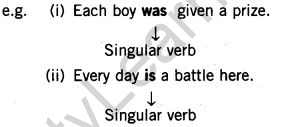
- If two nouns are connected by ‘and’ but are meant for one person or for one idea then the verb becomes singular.
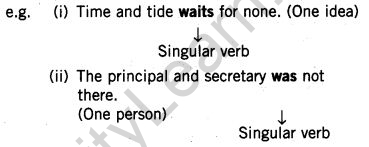
- When two subjects are joined by “as well as, along with, together with, in addition to” then the verb agrees to the first subject.
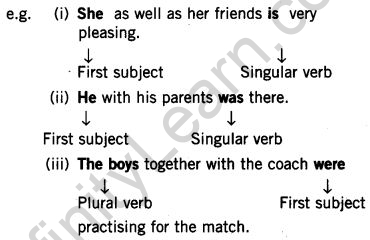
- When two or more subjects are connected by “or, nor, either or, neither nor” then the verb,
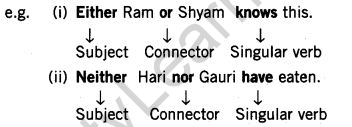
- If a sentence starts with introducing ‘there’ then verb agrees to the number of the noun that comes after ‘there’.
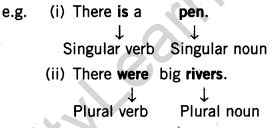
- Nouns, though plural but if they refer to the name of a book, country or that of a province then the verb used is ‘singular’.
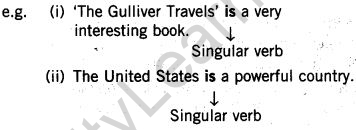
- When plural nouns refer as a whole then it is taken to be singular and the very is also singular.

- Phrase ‘a number of’ takes a plural verb but phrase ‘the number of’ takes a singular verb.
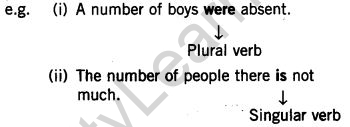
- Few, a few, many, several/both are plural in form and they take plural verb with them.
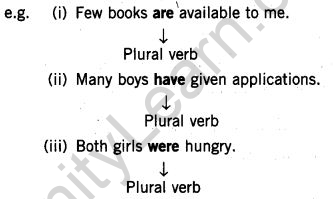
- If two subjects with different numbers are joined by “not only but also, either or, neither nor” then the verb agrees to the subject nearer to it.
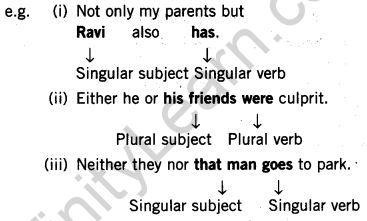
Practice Questions and Solutions
Question 1:
From the given sentences choose which one is correct and which one is incorrect on the basis of rules of subject verb agreement.
Instead of correct or incorrect, fill in the blank exercise with multiple options would have been more useful.
- Birds are taking rest on the tree.
- Maya does not get up in the morning.
- She loves chocolates very much.
- The players has stopped shouting.
- One of my sisters live in Ranchi.
- Chennai and Kolkata is beautiful cities.
- Every player and every coach are present,
- Mr Singh who was a poet and singer is no more.
- You and not me are the wrong doer.
- The rpbber with his friends was arrested.
- Geeta or Reeta have brought this candle.
- Neither he nor his father has appeared.
- There were many people around the temple.
- West Indies are a group of islands.
- Ten kilometres are a long distance by foot.
Solution:
- Correct
- Correct
- Correct
- Correct
- Incorrect
- Incorrect
- Incorrect
- Correct
- Correct
- Correct
- Incorrect
- Correct
- Correct
- Incorrect
- Incorrect
Question 2:
Fill the blanks that each sentence has in compliance to subject-verb agreement.
- Many forms ………………. been received, (has/have)
- One of the thieves ………………. been caught. (has/have)
- Ramu and Shyamu ………………. playing chess. (is/are)
- Each man and each women ………………. rejoicing. (was/were)
- The horse and cart ………………. lost. (is/are)
- Mahi as well as her teachers ………………. very much concerned. (is/are)
- My brothers along with my friend ………………. coming to my house. (was/were)
- Either of the two ………………. suitable. (is/are)
- Neither of the two girls ………………. going to win the competition. (is/are)
- A number of migratory birds ………………. coming to India during winter. (are/is)
Solution:
- have
- has
- are
- was
- is
- is
- were
- is
- is
- are
Question 3:
Match the entries in List I with List II to form various sentences.
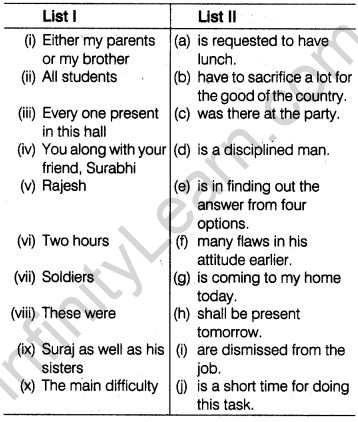
Solution:
(i) (g) (ii) (h)
(iii) (a) (iv) (i)
(v) (d) (vi) (j)
(vii) (b) (viii) (f)
(ix) (c) (x) (e)




